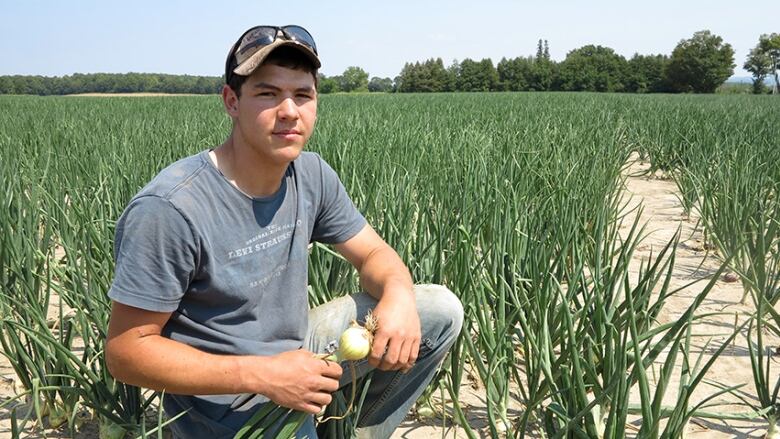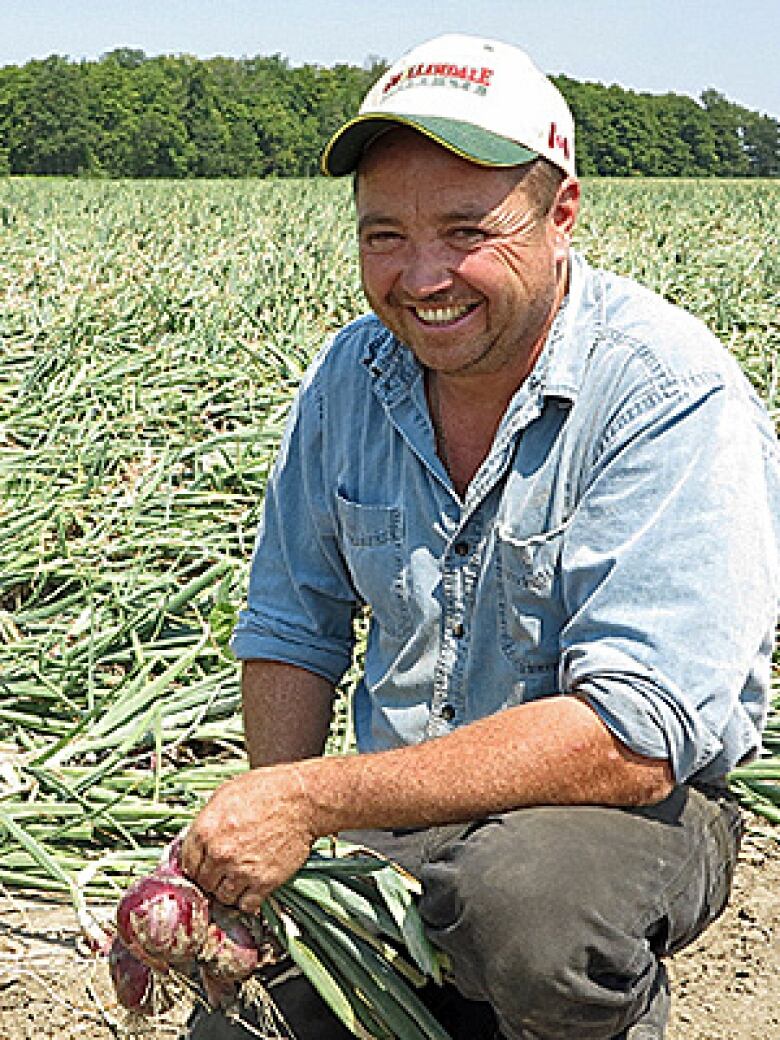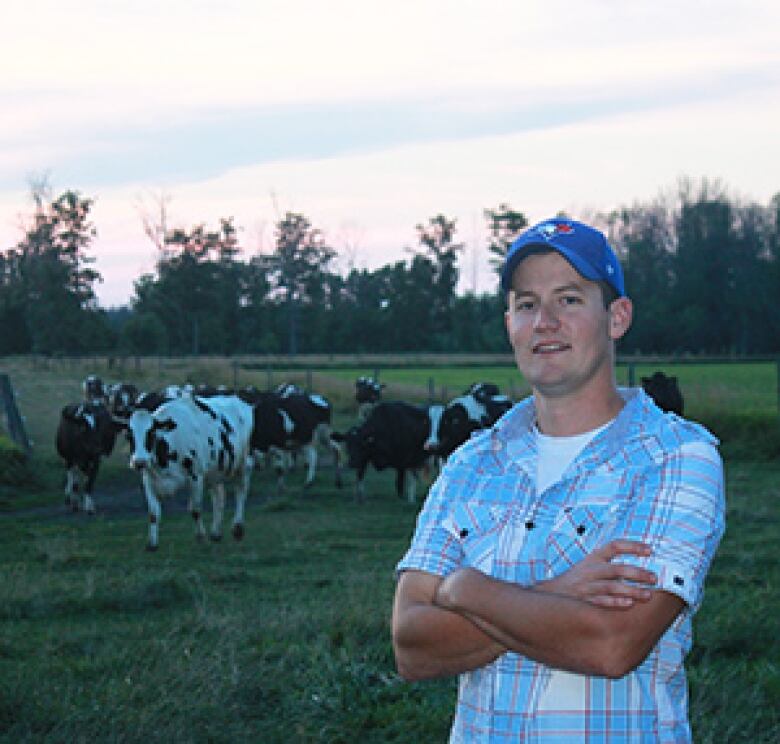Young people drawn to farming by income, job opportunities
Independence, diversity, lifestyle and better returns lure young Canadians to agriculture

Christopher Hambly has his career planmapped out.
He'll finish high school, head off for a few years ideally to study "something to do with agriculture"at the University of Guelph come home and eventually take over the family farm on the outskirts of the Holland Marsh, a lush agricultural area north of Toronto.
At 15, an age when many might not be so sure what they want to do with their lives, Christopher has no doubts.

"I grew up in it. I like doing it," he says, offering a simple assessment of his dream to lead the fourth-generation agricultural operation his father John has transformed into a multimillion-dollar enterprise that grows, packs and ships onions, potatoes, carrots, parsnips and beets across Canada and the United States.
Christopher, who spends every minute he can before school and after working around GwillimdaleFarms Ltd., has no hesitation about going into an industry that is proving attractive and in recent years more lucrative for young Canadians.
"There is a great deal of interest in going into agriculture,"says Alfons Weersink, a professor in the department of food, agriculture and resource economics at the University of Guelph. I can see that from the classes I teach."
That interest comes at the same time Canada's farmers are aging and becoming fewer in number.Statistics Canadas 2011 Census of Agriculture found the average age of farm operators was 54, up from 49.9 years a decade earlier. Farmers under 35 years of age represented just 8.2 per cent of the total of 293,925 farm operatorsin 2011, down from 11.5 per cent in 2001.
For those younger Canadians, the interest in making a living from the land may comeout of a sense of family devotion or obligation a farm thats been in a family for generations. Theres also the attraction of being your own boss and not being tied to a desk.
Emotions and pragmatism
And part of the interest could be an emotional appeal, what Lee Markert, a 28-year-old whos returned to the family pedigree seed and grain operation in Vulcan, Alta., calls a "magnetic pull"back to agriculture.
Weersink also sees a more pragmatic factor at work these days, particularly in the wake of rising prices for crops such as wheat and corn.
"Over the last half dozen years, just the profitability and the financial rewards have increased theres more than just the magnetic pull now thats attracting people, I think."
Figures from Statistics Canada show that from 2005 to 2010, gross receipts from farms producing oilseeds and grain increased by 49.5 per cent.
Those rising incomes have fuelled optimism about farming, suggests Andrew Campbell, a 27-year-old who farms with his wife and parents west of London, Ont.
"All of a sudden people are thinking 'Oh, I can make a living farming, I can come home.' "
Capturing a precise picture of Canadian farm income is not easy because of a wide range of farm types and sizes, but Statistics Canada figures show that the average total income for farm operators producing crops, including off-farm income, rose from $67,700 in 2007 to $96,293 in 2011.
Along with better fiscal fortunes for some commodities which could, of course, change theres the evolving nature of farming as a business, something Weersink suggests could have its own allure, particularly to those with entrepreneurial skills.
"It's also a very exciting sector to be involved in," he says. "I think a couple of generations ago it was just pure physical work that determined who was successful. Now boy, you have to be a marketer, you have to be human resource manager, you have to be computer savvy. There are a number of skills required, and I think thats attractive."
Melanie Sommers has seen the range of skills needed first-hand after she returned to the family dairy operation in Lancaster, Ont., southeast of Ottawa.
The 28-year-old had been working in commercial real estate in Montreal, but "did not enjoy that at all."She went back to the farm in 2008.
"I guess I always knew in my heart that I wanted to be on the home farm."
'Amazing lifestyle'
With her parents, Sommers runs a 580-cow operation that has up to 13 full-time employees, depending on the time of year. Soybeans, corn and hay are also produced on about 1,900 acres.
Sommers spends 50 to 60 per cent of her time in the field. The rest is devoted to management. She relishes the "amazing lifestyle"farming offers her, particularly the opportunity to work with her family toward a common goal.
"I just love what I do. Im passionate about it. I love knowing that I planted that crop and watching it grow."
She also sees "endless" job opportunities and possibilities for young people considering careers in agriculture.Still, she knows that its a way of life complete with its long and sometimes unpredictable hours that doesnt appeal to everyone.
"Not everybody looks at this lifestyle or career as an easy way of making a living. Most people dont see it as very professional, either. I think a lot of young kids are looking for professional careers: doctors, lawyers, that sort of area.
"Its not a very appealing industry to young kids."
But, she suggests, it could be.
"Theres a big stigma attached to farming, too, right? A lot of people dont see that youre in a $20-million or $30-million business, depending on your size."
Educating the public
Markert, whoalso serves as vice-chair of the Alberta Canola Producers Commission, sees the potential to change the image others may have of farming as a career choice.
"Its a matter of educating the public that were more than just people that work from dawn until dusk every day. Theres a business involved in it now and you can be successful."
In order for the next generation to make [a farm] succeed, theyre likely going to have to get a break from their parents on the sale or the transfer of it.- AlfonsWeersink, University of Guelph
Still, its not necessarily easy for a young person to become a farmer. Land prices are at record highs $10,000 an acre or more in southern Ontario, for example and the capital investment required for a viable commercial farm operation is huge.
Figures from Statistics Canada show that the average value of total assets per farm in Canada rose from nearly $1.5 million in 2007 to $2 million in 2011.
Markert knows the support he has had from his family and the opportunity to be part of its thriving farm business, which seeds about 4,700 acres, has been invaluable.
"It was definitely a huge help in me getting started,"says Markert, who suggests someone who doesnt have a family tie try "getting on with a big farm and finding a way to work yourself up the ladder."
Family farm operations can bring with them their own challenges around sons or daughters taking over.
"In order for the next generation to make it succeed, theyre likely going to have to get a break from their parents on the sale or the transfer of it,"says Weersink.
Campbellacknowledges the challenge of good succession planning and has been carefully easing his way into the family dairy and cash crop operation.
Making a mark
"We worked away for a couple of years before we actually became part of the farm in terms of ownership,"he says. "We didnt get involved too far in capital.
"This is really the first year getting into hyper-drive and expansion and trying to make our mark, make our investment in the farm to make sure that it has longterm success."

Earlier this year, Campbell, whohas a media consulting firm, launched an initiative for young farmers in Ontario to try to increase public understanding about where food comes from and what farmers do.
"Dinner Starts Here"has a team of 10 farmers who take to social media, discussing everything from how farmers keep milk cold to why many pig farmers shower before they go into the barn. (It's done to keep the chances of new bugs or diseases entering the barn low.)
Campbell himself finds it a challenge to explain what's attractive about farm life.
"That is actually one of the hardest questions I get."
He considers how he enjoyed his childhood on the farm, how he hopes his own family will have a similar experience, the independence being a farmer offers and the opportunity to see a business grow.
Theres also a sense of accomplishment, he says, looking around and seeing how crops have grown or cows have improved over the year.
And that sense, he says, "is pretty nice to have."












_(720p).jpg)


 OFFICIAL HD MUSIC VIDEO.jpg)
.jpg)



























































































